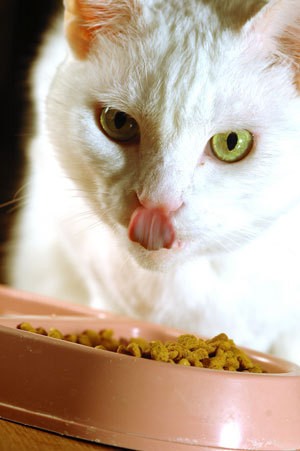 Some foods that are perfectly safe for humans or other pets can be dangerous for your kitties!
Some foods that are perfectly safe for humans or other pets can be dangerous for your kitties!
Many houseplants can be dangerous for your cats, too. Lilies are especially dangerous, and can cause kidney damage. For a full list of dangerous plants, visit the Cat Fancier's Association website: http://www.cfa.org/articles/plants.html
If you believe your cat has been exposed to something poisonous, stay calm. Call the veterinarian and warn them that you are on your way in with a suspected poisoning. Tell them what your cat ate, how long ago, and what the symptoms are. If you can, bring the container that held the dangerous food, and gather up a sample of what your cat has thrown up or passed. These things may help your veterinarian determine exactly what poisons are involved in your pet's illness.
If you can't get to a veterinarian quickly, call the ASPCA Animal Poison Control Center at 1-888-4-ANI-HELP. The hotline is available twenty-four hours a day, every day of the year. There is a small fee for the service.
Here are the questions asked by community members. Read on to see the answers provided by the ThriftyFun community.
I thought cats were highly allergic to garlic, yet a lot of people on this site seem to include garlic in their homemade cat food recipes and to avoid fleas on their cats. Is garlic toxic to cats?
By caryn from Toronto, Ontario
Why not call your vet's office and ask them this question? They should be able to give you good advice.
The following is a list of foods that cats should never eat:
Onions, Garlic, & Related Root Vegetables
Onions contain a substance (N-propyl disulphide) which destroys red blood cells in the cat, causing a form of anemia called Heinz body anemia. Garlic contains a similar substance in a lesser amount.
Green Tomatoes, Green (raw Potatoes)
These foods are members of the Solanaceae family of plants, which includes the Deadly Nightshade, and contain a bitter, poisonous alkaloid called Glycoalkaloid Solanine, which can cause violent lower gastrointestinal symptoms. The leaves and stems are particularly toxic. (Tomatoes in pet foods are ripe, and should cause no concern because they appear in relatively small amounts)
Chocolate
It's becoming more widely known that chocolate is very toxic to both cats and dogs. Theobromine is the offending substance here. Janet Tobiassen Crosby, D.V.M. has an excellent article on the symptoms, effects, and treatment of chocolate toxicity.
Grapes and Raisins
These foods' toxicity has mainly been found in dogs, in quantities of varying amounts. The ASPCA advises: "As there are still many unknowns with the toxic potential of grapes and raisins, the ASPCA Animal Poison Control Center advises not giving grapes or raisins to pets in any amount." That's good enough for me.
Milk
Although milk is not toxic to cats, it may have adverse effects. Simply put, adult cats fed a nutritious diet don't need milk, and many cats are lactose-intolerant, which means that the lactose in milk and milk products produces stomach upset, cramps, and gassiness. If your cat loves milk, and begs for it, a small amount of cream may be okay, two or three times a week. (The more fat in the milk, the less lactose.) Another compromise is CatSip, a product made from skim milk with an enzyme added that helps the digestion of lactose. Catsip is available in supermarkets such as Safeway, Albertson's and A&P, as well as pet products chains, such as PetSmart and Petco.
These are the most commonly seen "people foods" that are potentially harmful to cats. The bottom line is to feed your cat nutritious food developed with his needs in mind and choose treats designed for cats instead of table scraps.
If You Think Your Cat Has Been Poisoned contact your veterinarian.